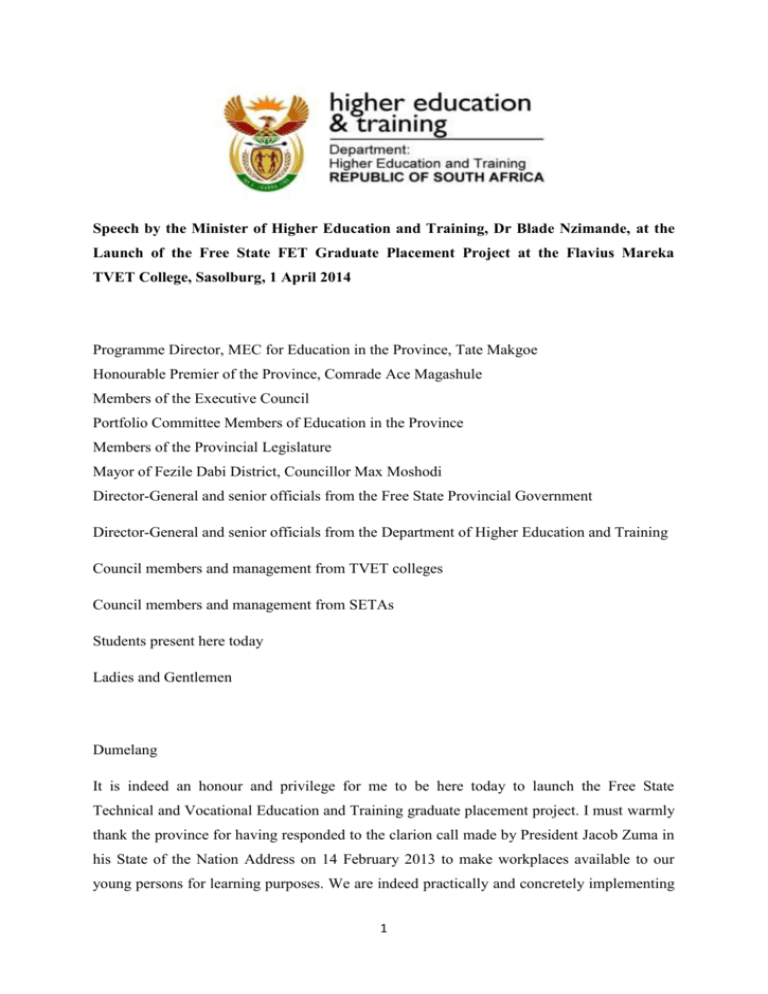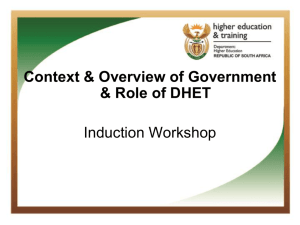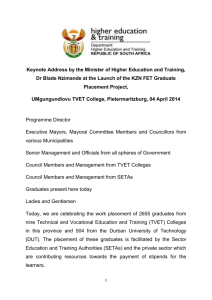1 April 2014 - Department of Higher Education and Training
advertisement

Speech by the Minister of Higher Education and Training, Dr Blade Nzimande, at the Launch of the Free State FET Graduate Placement Project at the Flavius Mareka TVET College, Sasolburg, 1 April 2014 Programme Director, MEC for Education in the Province, Tate Makgoe Honourable Premier of the Province, Comrade Ace Magashule Members of the Executive Council Portfolio Committee Members of Education in the Province Members of the Provincial Legislature Mayor of Fezile Dabi District, Councillor Max Moshodi Director-General and senior officials from the Free State Provincial Government Director-General and senior officials from the Department of Higher Education and Training Council members and management from TVET colleges Council members and management from SETAs Students present here today Ladies and Gentlemen Dumelang It is indeed an honour and privilege for me to be here today to launch the Free State Technical and Vocational Education and Training graduate placement project. I must warmly thank the province for having responded to the clarion call made by President Jacob Zuma in his State of the Nation Address on 14 February 2013 to make workplaces available to our young persons for learning purposes. We are indeed practically and concretely implementing 1 the demand of the Freedom Charter, that “the Doors of Learning and Culture Shall be Opened”. Ladies and Gentlemen, let me bring to your attention that comrade Ace Magashule, our Honourable Premier here in the Free State, took it upon himself to ensure that the student placement project becomes his priority, in support of our slogan of “Turning, every workplace into a training space”. In prioritizing workplace learning for our TVET college students he worked closely with his Executive Council, provincial heads of department and municipal leadership. In two consecutive State of the Province addresses, in 2013 and 2014, Premier Magashule, our dedicated and loyal ANC cadre, emphasised the Free State government’s commitment to this project. His vision is also in line with the White Paper on post-school education, launched on January 16 which emphasises the link between workplace and classroom education. To ensure the success of the project, not only was a structured and co-ordinated vision conceptualized but it was made to become reality. Decisive leadership led to more and more key stakeholders committing themselves to the project, with Sector Education and Training Authorities (SETAs) providing stipends to students and some employers from the private sector also coming on board. As DHET we are grateful to you and your provincial government, comrade Magashule, for providing guidance and leadership to this placement project. It is clear that you have the political will to address the plight of our country’s youth. Siyabonga ndoda yamadoda. Today, thirty-seven days before the fifth democratic elections on the 7th of May, we are gathered here to bear witness to yet another story of government delivery - the learner placement programme. We are agents of change, and pride ourselves on tackling directly the triple challenges of poverty, unemployment and inequality in an effort to empower our youth to become active citizens contributing to their own development and to the country’s economy. Over 3.4 million of the country’s young people between the ages of 15 and 24 are not in employment, education or training. Projections show that if average annual economic growth were to rise to 5%, unemployment amongst 15-24 year olds would be around 44% and 31% by 2020 and 2030 respectively. This simply means that in the absence of special intervention programmes like this one, the outlook for our country’s youth is grim indeed. We must 2 therefore ensure that our programmes and policies focus on developing skills that are required by the economy so that our youth become part of the mainstream economy. Exposure of students to a workplace environment enhances the credibility of their skills and qualifications. It also provides a platform for industry to become the co-designers of the TVET curriculum by shaping the learner in what is needed in terms of work in the particular industry he or she has studied. This facilitates a constructive mutual relationship between technical and vocational education and industry. The learner placement programme is gaining substantial ground within the country’s provincial governments and I am delighted that Free State has taken the lead in this matter. In November 2013 we launched a similar programme in Gauteng where the Premier of the Province, the Honourable Nomvula Mokonyane, opened the doors of her government’s different departments so that our youth can acquire practical skills. This coming Friday (4th of April) we will be launching yet another project of the same kind in Pietermaritzburg in KwaZulu-Natal. We are indeed making progress in ensuring that our young people are not left without skills and professional orientation. Comrade Magashule, perhaps we need a national event to honour those who have institutionalised the placement of youth in various learning programmes. We need partnerships with the SABC and media houses for this placement programme to be equally publicised as our sporting and music awards. I am sure this is one way to motivate more private companies to join government in an effort to empower the country’s youth. Since the establishment of the DHET, great strides have been made in improving placement of VCET college graduates. We do so because we want to ensure that the youth of this country is empowered, free from the stresses of poverty and unemployment. These measures include: Signing the National Skills Accord in 2011 with stakeholders such as business and government on students’ placement in the workplace. Establishing the Chief Directorate of Work Integrated Learning Partnerships and Innovation in 2012 to focus specifically on solidifying partnerships for placement of learners. 3 Signing the Youth Employment Accord in 2013, with Commitment 2 focusing on work exposure. Partnering with the Department of Public Service and Administration to coordinate placement in the public service. Opening SETA offices in TVET colleges with a primary focus on townships and rural colleges. Presently, there are more than 40 SETA offices in TVET colleges. However, more needs to be done to ensure that all 50 TVET colleges have SETA offices. This, together with TVET graduate placements, internships and learnerships should remain a high priority for all SETAs in the coming months. Revising the Levy Grant Regulations to provide scope for employers to take in unemployed graduates using grant mechanisms administered by SETAs. Notwithstanding the court challenge to these regulations by BUSA, we remain confident that these efforts will yield good results. Our statistics, from January 2013 to December 2013, indicate that since the implementation of the new grant regulations, we have seen an increase to 10 714 in the placement of TVET college graduates for both NC (V) and ‘N’ courses within the country. The Free State on its own managed to place over 1 800 students. I must also indicate that the private sector is coming aboard. I believe that in skills development, together we can achieve more. I am also pleased that this launch is being held in one of our public TVET colleges at a time when we are expanding access to post school education and training. As government we take TVET education seriously. The White Paper on Post-School Education and Training emphasizes the crucial role of technical and vocational education and sets out our strategies for transforming it further, defining its place in the post-school system and ensuring that it becomes a path to a brighter future for its students and for the country. TVET student enrolments increased by 131% from 345 566 in 2010. We are now targeting 800 000 in 2014. Our 2030 enrolment targets are 1.62 million in public universities, 2.5 million in TVET colleges, 1 million in community colleges and 0.5 million in private institutions. The National Student Financial Aid Scheme (NSFAS) budget for 2014/15 amounts to R6 billion, comprising R3.9 billion set aside for universities and R2.1 billion for TVET College bursaries and loans. This budget has grown from R578 million in 2005 to over R9 billion in 2014, taking into account all bursaries and loans administered by NSFAS from other 4 Government departments and entities. An additional R1 billion was made available from the National Skills Fund to NSFAS to reduce the 2013 and 2014 university bursary and loan shortfall. This substantial injection of state funds into student financial aid will go a long way in providing access for academically deserving students and towards opening the doors of post school education and training to all deserving young people. We are also building a new campus in Harrismith for Maluti TVET college, the first in that part of the Free State. For the first time the people of the Maluti a Phofung municipality will proudly enjoy the benefits of having their own post-school education facility for multiple educational purposes. In partnership with universities, the facility will also offer Higher Education degrees for both full-time and adult learning students. This approach is in line with the White Paper on Post-school Education which emphasises correlation between all stakeholder institutions within the post-school sector. In line with our vision of providing a seamless, integrated and co-ordinated post-school education system, we have experienced a high level of collaboration between the four public TVET colleges and the two Universities in the Province, the Central University of Technology and the University of Free State. A memorandum of understanding has been signed between Central University of Technology and the four public TVET colleges. Three key strategic areas for collaboration were identified, namely; articulation between the colleges and the University of Technology with regard to admission requirements for National Vocational Curriculum (NCV) students, continuous Professional Development of college lecturers and the promotion and teaching of Science, Technology, Engineering and Mathematics. There are other positive developments in the TVEC sector which I think need to be highlighted. Before 1994 FET colleges did not have Student Support Centres to enhance academic performance. Today, all four TVEC colleges in the Free State, including this one (Flavius Mareka), Goldfields, Maluti and Motheo have Student Support Centres connected to the internet, enabling students to do on-line research. There are also other on-line educational software programmes installed to improve academic performance. As I close, I would like thank all the students present here today for gracing this occasion. You will I am sure be aware that government is doing its best to ensure that you play a significant role in the economy of South Africa. To those students who have received placements, this is an opportunity to acquire practical skills and rub shoulders with experienced 5 workers in your respective fields. I urge you to complete your workplace learning programmes. They will enable you to be on solid ground in securing full time employment. I would also like thank all the SETAS for their participation in and contribution to this placement project. Your role in the reconstruction and development of our country is greatly appreciated. Placement of students must continue to be an integral component of your strategic priorities as this is an integral part of the skills revolution of our country. Premier and comrade Magashule, together with your Executive Committee, I must really thank you for your commitment to the cause of our young people. It is no wonder that this Province outperformed others in 2013, producing the country’s best Grade 12 results. 87% pass rate at matric level is no mean feat. You and others in the private sector are the anchor of this work placement project. Without workplaces for our students, we would have not succeeded in implementing this mammoth project. The project has also demonstrated to us the limitless possibilities of a working social contract between the state and the private sector as we continue to build our beloved country along the lines of a non-racial, non-sexist, equal and democratic state, capable of dealing with the triple challenges of poverty, unemployment and inequality. Thank you also for establishing the Provincial Student Support Service Forum which facilitates a co-ordinated strategy on student placement, thus helping to ensure success in work based experience. As I mentioned earlier, we have opened SETAs in TVEC colleges to facilitate student placement and career guidance and these, working hand in glove with the colleges, must establish a working relationship with the Provincial Student Support Services Forum. I would also like to thank the Free State government for developing the Provincial Manual. This guiding document will greatly assist in administering services to students involved in workplace learning. It is a charter for uniform operations in the province which will greatly assist our students and host employers in the implementation of this noble project, facilitating the smooth monitoring and supervision of students. My dear comrade, my request to you is: Let us look into ways and means to place those students who have not yet secured workplace training. We know and acknowledge the fact that 1926 students have been placed since 2013 and that 596 could not find placements. Let 6 us do our best to accommodate the students who have not yet been placed. And let this placement programme be an annual one in the name of youth empowerment. Kea leboha 7







